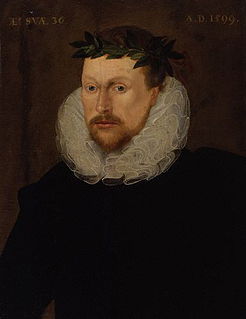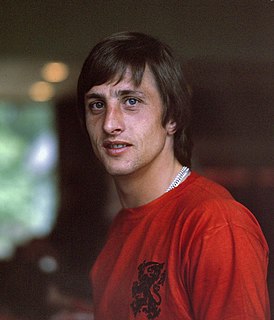A Quote by John Owen
Let not that man think he makes any progress in holiness who walks not over the bellies of his lusts. He who doth not kill sin in this way takes no steps toward his journey's end.
Related Quotes
Here when the labouring fish does at the foot arrive, And finds that by his strength but vainly he doth strive; His tail takes in his teeth, and bending like a bow, That's to the compass drawn, aloft himself doth throw: Then springing at his height, as doth a little wand, That, bended end to end, and flerted from the hand, Far off itself doth cast. so does the salmon vaut. And if at first he fail, his second sommersault He instantly assays and from his nimble ring, Still yarking never leaves, Until himself he fling Above the streamful top of the surrounded heap.
Wrath, unlike love, is not one of the intrinsic perfections of God. Rather, it is a function of God's holiness against sin. Where there is no sin, there is no wrath-but there will always be love in God. Where God in His holiness confronts His image-bearers in their rebellion, there must be wrath, or God is not the jealous God He claims to be, and His holiness is impugned. The price of diluting God's wrath is diminishing God's holiness.
Sin is more dangerous than wild bears, more deadly than blazing forest fires. Ask Nebuchadnezzar, who lost his mind because he refused to deal with his pride. Ask Samson, who was reduced to a pathetic shred of a man because he never got control over the lusts of his flesh. Ask Achan and Ananias and Sapphira, who all lost their lives over “small,” secret sins.
Christ will be master of the heart, and sin must be mortified. If your life is unholy, then your heart is unchanged, and you are an unsaved person. The Savior will sanctify His people, renew them, give them a hatred of sin, and a love of holiness. The grace that does not make a man better than others is a worthless counterfeit. Christ saves His people, not IN their sins, but FROM their sins. Without holiness, no man shall see the Lord.
There must be a solemn and terrible aloneness that comes over the child as he takes those first independent steps. All this is lost to memory and we can only reconstruct it through analogies in later life....To the child who takes his first steps and finds himself walking alone, this moment must bring the first sharp sense of the uniqueness and separateness of his body and his person, the discovery of the solitary self.
Holiness provokes hatred. The greater the holiness, the greater the human hostility toward it. It seems insane. No man was ever more loving than Jesus Christ. Yet even His love made people angry. His love was a perfect love, a transcendent and holy love, but HIs very love brought trauma to people. This kind of love is so majestic we can't stand it.
The king is but a man, as I am; the violet smells to him as it doth to me; the element shows to him as it doth to me; all his senses have but human conditions; his ceremonies laid by, in his nakedness he appears but a man; and though his affections are higher mounted than ours, yet, when they stoop, they stoop with the like wing.






































